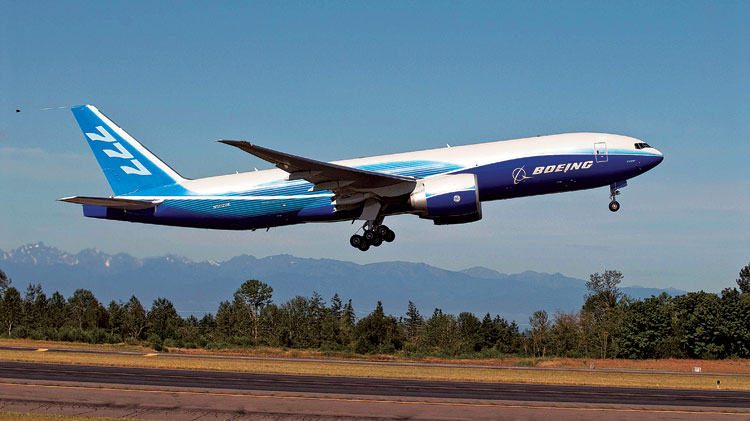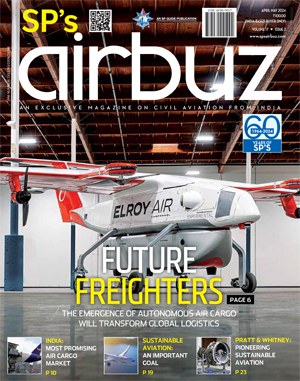Boeing Supports Indian Air Cargo Growth
India’s cargo aviation industry expands through partnerships for resource development and technological innovation to meet growing air cargo demand.
 | BY RYAN WEIR, Vice President of Commercial Sales and Marketing for India, Boeing Commercial Airplanes |

India’s air cargo industry initially suffered during the COVID-19 pandemic as South Asian imports and exports faced disrupted supply chains, closed borders and hampered movement. However, Air Cargo to key regions started rebounding in 2022, and that recovery has continued.
India dominates South Asian freight traffic today. In 2021, India was responsible for more than 60 per cent of South Asia’s imports and exports. The top four airports by freight traffic were located inside India’s borders. The same year, Europe supplanted East Asia as South Asia’s top air cargo trading partner, with total trade surpassing 8,17,000 metric tonnes.
India’s Air Cargo fleet (less than 15 airplanes) relative to a GDP of over $3 trillion indicates a huge opportunity for significant fleet growth as GDP growth remains strong and resilient. The Indian Government and the aviation industry, including Boeing, are partnering to develop this key economic opportunity in multiple ways.
CARGO OUTLOOK AND DRIVERS
From the rise in e-commerce for consumer goods to demand for general freight, Boeing forecasts the world freighter fleet to grow more than 70 per cent over the next 20 years.
The current baseline growth scenario is 60 basis points higher than Boeing’s 2020 forecast, driven by India’s strong economic recovery as well as a base year (2021) that had 19 per cent less tonnage than 2019 due to the pandemic. The Make in India campaign is a primary growth driver in both imports (machinery and chemicals) and exports (finished products).
Boeing anticipates a demand for more than 75 freighters, including production and converted freighters, to meet India’s growing cargo demand. The majority of the cargo fleet will consist of converted standard-body aircraft for domestic and regional growth, along with a number of production and conversion widebody freighters for global operations.
Boeing forecasts India’s air cargo growth to average 6.9 per cent annually over the next two decades, driven by the country’s manufacturing and e-commerce sectors. The rise of e-commerce is seen particularly in emerging markets with underdeveloped ground and postal networks. Manufacturing-driven cargo includes the rise of high-end electronics such as smartphones and wearables, along with other value-added manufacturing, such as semiconductors.
BOEING’S CONTRIBUTIONS TO THE INDIAN CARGO MARKET
Boeing freighter and Boeing Converted Freighter operators in India include SpiceExpress, Blue Dart and Quikjet.
Passenger-to-freighter conversions such as the Boeing 737BCF and 767BCF offer commercial airplane owners an opportunity to realise the greatest value from their airplane assets in preparation for the long-term growth projected for the air cargo industry. India also has an opportunity for production freighters that include the 767F, 777F and 777-8F as the country’s cargo network can expand to provide nonstop flights to Europe, North Asia, Oceania and North America.
Recently, Boeing announced an agreement with GMR Aero Technic to establish a new Boeing Converted Freighter line in Hyderabad. GMR Aero Technic is the first Boeing supplier in India that will have the capability to support future conversions of both domestic and foreign aircraft.
The collaboration with GMR Aero Technic supports the anticipated growth of the cargo sector and contributes to India’s aspiration to become a regional aviation and aerospace hub.
INFRASTRUCTURE DEVELOPMENT
The Indian Government’s focus on the Air Cargo sector is expected to help the industry grow rapidly in the coming years. India’s commitment is evident through substantial investments in new airports, expansion of existing ones, and the construction of state-of-the-art Cargo terminals.
The Government’s National Air Cargo Policy, introduced in 2020, streamlines the regulatory environment, making it easier for businesses to import and export goods by air.
Boeing’s collaboration with GMR Aero Technic to establish a BCF line in Hyderabad helps expand complex aircraft modification capabilities and Maintenance, Repair and Overhaul (MRO) in India. The agreement also testifies to the maturation of Indian MROs in the country to support the vision of Atmanirbhar Bharat.
WORKFORCE TRAINING
India’s aviation growth is intensifying demand for skilled professionals across the industry. Recognising this need, Boeing recently announced a $100 million investment in infrastructure and programmes to train pilots in India. This investment will support the country’s requirement for new pilots over the next two decades.
Boeing’s focus on building and enhancing pilot training academies, maintenance training capabilities, and simulator capacities within India reflects its commitment to the country’s goal of transforming the training landscape. Aspiring professionals in the aviation industry can expect ample opportunities for growth and development within India, thanks to the collaboration between industry stakeholders like Boeing and the Government.
India’s long-term forecast growth in air traffic, along with the availability of a large pool of skilled aviation technicians and engineers, positions the country well to become a key regional player in the commercial aviation sector.
TECHNOLOGY INNOVATIONS TO INCREASE EFFICIENCY
Technology plays a pivotal role in revolutionising air cargo operations through streamlining processes and enhancing overall efficiency. It was a key topic at the India Air Cargo Symposium presented by Boeing in 2023. Industry stakeholders discussed strategies that would overcome challenges and make the most of opportunities to grow.
For example, by automating manual tasks, such as data entry, tracking and scheduling, technology frees up employees to focus on more strategic endeavours while reducing the likelihood of human error.
Real-time visibility into cargo shipments is made possible through tracking software. Technology also reinforces security by proactively identifying and addressing potential threats.
Cutting-edge software optimises routing, minimising costs and improving delivery times by considering factors such as traffic, weather, and fuel prices. Seamless communication among stakeholders in the cargo supply chain, including shippers, carriers, and customs officials, ensures streamlined processing and mitigates delays.
Boeing also has introduced technology innovations that increase air cargo efficiency. In early 2023, the company launched its first India-based Global Support Centre in Gurgaon. The Centre will deliver customised operational-efficiency and safety-improvement projects for Boeing’s airline customers, civil aviation regulatory bodies and other industry stakeholders.
Meanwhile, Boeing Research & Technology-India has delivered commercially viable solutions for Airplane Health Management and Air Traffic Management (ATM). The company’s ATM experts are working with the Airports Authority of India to develop a roadmap for the modernisation of air traffic management in the country.
By leveraging technology, Boeing aims to enhance the overall performance and competitiveness of the Indian air cargo industry.
BOEING’S COMMITMENT TO INDIAN AVIATION
With over eight decades of presence in India, Boeing has built a strong network of support for its customers in the region. Through multiple initiatives and partnerships, Boeing demonstrates its commitment to supporting the growth of Indian cargo and passenger aviation, contributing to the development of the Indian economy.
Boeing is honoured to collaborate with stakeholders across India in strategic partnerships, infrastructure development, workforce training, and technological innovations that will ensure the air cargo industry’s growth and success.





